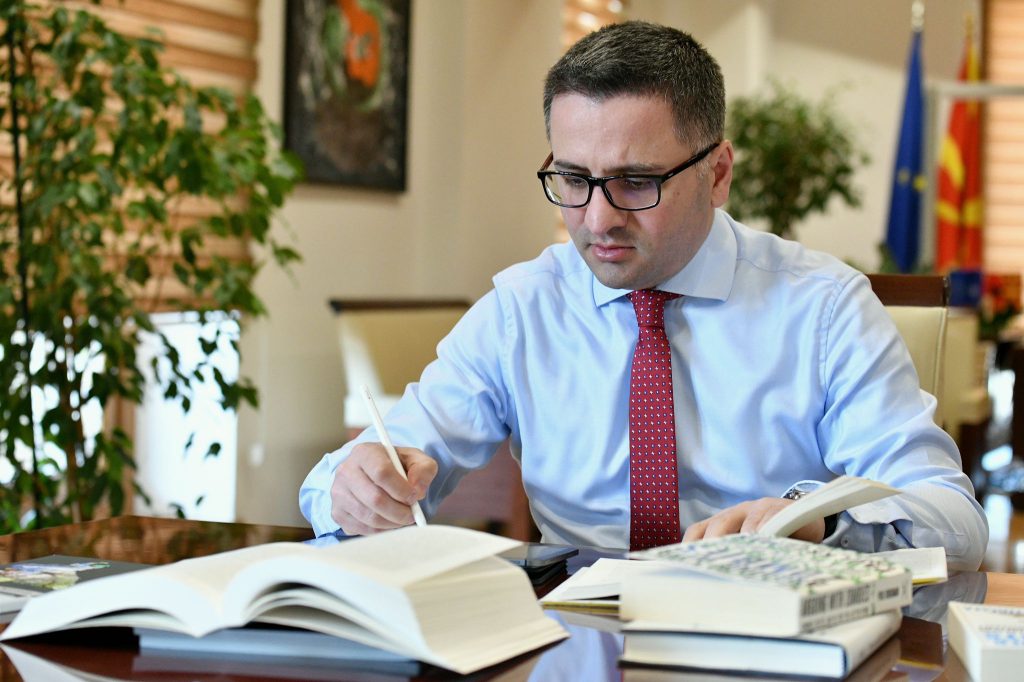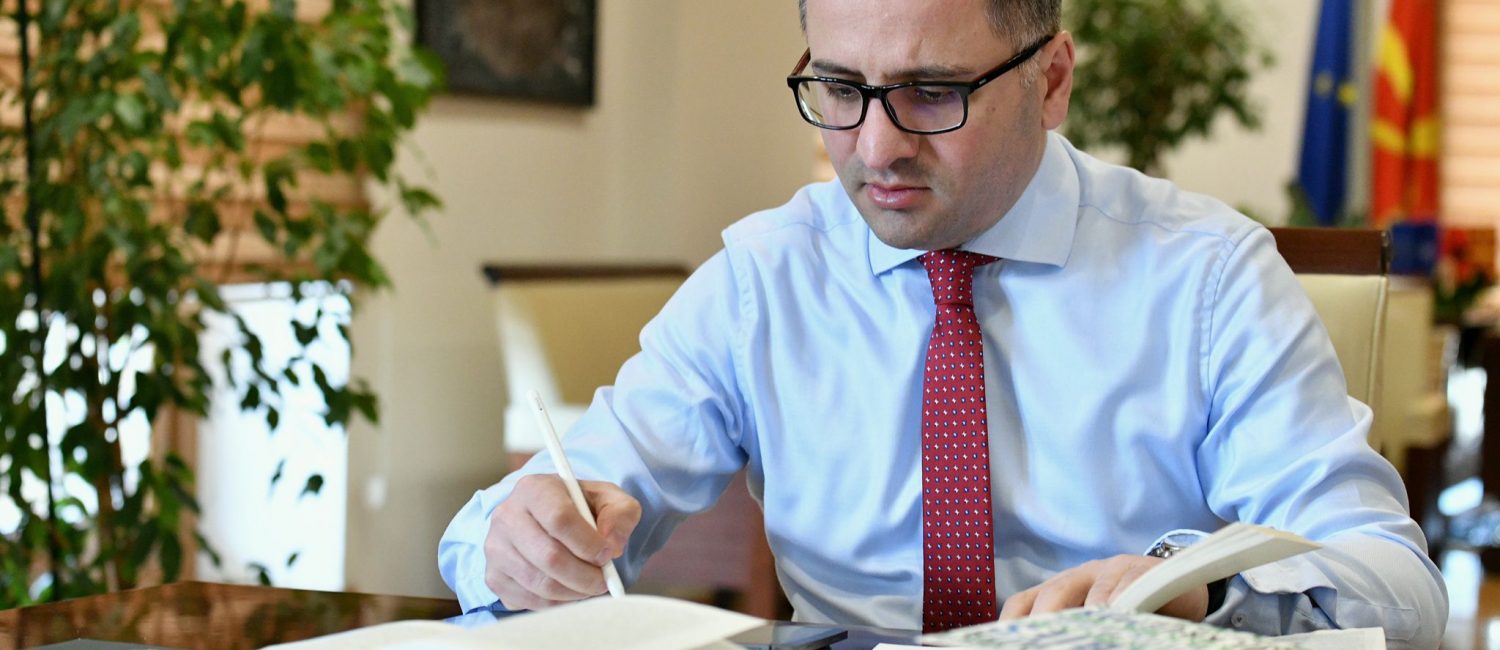16th April 2022, Skopje – Paul Samuelson, father of modern economics and winner of Nobel Prize in Economic Sciences, said: „The growth of a nation’s productive potential is the central factor in determining its growth in real wages and living standards“. Other winner of Nobel Prize in Economic Sciences, Joseph Stiglitz, has created the marginal productivity theory saying that “everyone participating in the production process earns remuneration equal to her or his marginal productivity, i.e. what they contribute to the process“. Or as Nobel Prize winner Krugman would say “Productivity is not everything, but on the long run, it is almost everything“.

Productivity, as growth factor, is found in all models of economic growth. As regards exogenous models of growth, it is found in Cobb-Douglas model through the coefficient of total factor productivity, as well as in Solow model expressed through technological development, and other models, where economic growth, as a result of productivity, increases within same units of capital and labour. Productivity is at the core of all endogenous models of growth, such as the models of Nobel Prize winners Romer, Lucas and others, maintaining that investments in human capital, innovations and knowledge can permanently generate economic growth, thereby stimulating the positive externalities in the economy with adequate economic policies.
Productivity, in economics, measures output per unit of input, such as labor, capital, or any other resource. When productivity grows, potential gains, i.e. wages, corporate profit and living standards, grow as well. A country’s ability to improve the standard of living of its citizens depends almost entirely on its ability to raise its output per worker. Productivity is actually the source of economic growth and competitiveness.
In economics, there are number of indicators to measure productivity. One of them is labour productivity, according to which GDP is divided by hour of working time of all employees. Countries with the highest labour productivity in 2020, according to OECD data, are Ireland with US$ 119.4 generated GDP per hour worked, followed by Luxembourg with US$ 111, Denmark with US$ 87.9, Belgium with US$ 87, Norway with US$ 85.7 and Switzerland with US$ 91.6. France with US$ 79.8, Austria and the USA with US$ 79.6 and Sweden with US$ 79.2 generated GDP per hour worked are among the top ten countries. In a nutshell, the developed and viable economies.
Our worker output is twice as less than the one in the EU
Another indicator to measure labour productivity is worker output. According to this indicator, measured by the World Bank, Republic of North Macedonia generated US$ 43,883 per employee in 2020. Compared to the Western Balkan countries, our values as regards this indicator are relatively similar. As a matter of fact, during the same period, Montenegro generated US$ 50,865 per employee, with Bosnia and Herzegovina, Serbia and Albania generating US$ 47,051, US$ 43,874 and US$ 31,883 respectively per employee. Compared to the other countries in our vicinity, bigger difference is noticeable, for instance, Slovenia generated US$ 79,612 per employee in 2020, while Croatia generated US$ 67,138. When compared with the average of the European Union (US$ 93,073 per employee), we are lagging behind by almost twice. Germany, as the largest economy in the EU, generated US$ 100,765 per employee in 2020.
There are lot of factors affecting a country’s productivity, including investments in equipment, innovation, supply chain setup, education, competition, etc. Total Factor Productivity – TFP is the indicator which measures the economic output according to all inputs used to produce the respective goods and services, such as labour, capital, energy and materials. According to this indicator, during the pandemic, productivity in the Republic of North Macedonia dropped by -4.5 compared to the last ten years prior to the crisis, which is due to the decline of labour productivity (which is understandable, considering the lockdown of entire economic sectors due to preventive health measures). For comparison purposes, in relation to the pre-crisis period, decline in the other Southeast European countries is -2.6. Moreover, while this indicator has become positive (1.5) in the post-pandemic period in the region, indicating that productivity has reached and exceeded the pre-pandemic level, it is still negative in our country, above all due to the slower recovery of labour productivity quantity and quality.
When looking at the bigger economic picture, what do such data speak of? Simply put, let’s view the overall economy as a workshop. A craftsman manufactures products, which he then sells. He has skills and ability to manufacture ten products daily. At the same time in other workshop, other craftsman manufactures twenty products daily, because he has better skills, better tools, and uses innovative ways to work faster. This is the ratio between our economy and any developed economy. Therefore, simply said, wages and the living standard in the developed economies are proportionally higher. When coupled with the product’s quality, technology innovations, production organization and marketing, the disproportion broadens even more. This is the economic logic behind increased wages and better living standard – the one who manufactures and sells the most products will live better.
Human Capital: This is where productivity and growth stem from
How to higher wages and better living standard? Through productivity growth. Adopting adequate policies should be geared towards structural factors, which, on the other hand, will contribute to better quality and increased quantity of labour productivity and better usage of both capital and resources. Capital implies investments in infrastructure, digitalization of processes, innovations, above all investments in human capital.
I have written a lot about the investments in durables, infrastructure, encompassed in an ambitious agenda – Growth Acceleration Plan. Now, I would focus more on human capital, since it all stems from there.
Improved human capital is of essential importance for a more sustainable and more inclusive economic growth and development, productivity growth, inclusion of the labour market and aging of the population. By definition, human capital consists of education, knowledge, skills and health which people invest in and accumulate throughout their lives, enabling then to realize their full potential and be more productive members of the society. Hence, human capital is the crucial resources of a country, blending the other factors of production, i.e. physical capital. Investments in human capital affect total future earnings. Research has shown that a year of additional schooling, increases earnings by 9% annually.
According to Human Capital Index of the World Bank, quality of human capital in the Republic of North Macedonia increased from 0.54 to 0.56 between 2010 and 2020. However, it is still low, since a child born in North Macedonia today will be 56 percent as productive when she grows up. For comparison purposes, a child born in the developed countries will be 80% as productive, while the EU average is 0.57 or 75% of the potential productivity.
This column will focus on education in the interest of the public debate and the social-economic dialogue which takes place between the Government and the education unions, with the Prime Minister and several Minister directly involved. Building the human capital involves investments in and improvement of the education, the health and the social protection, as well as the general economic and social environment. All these areas are of exceptional importance and are complex. In addition to education, without quality healthcare services and social protection it cannot be expected for productivity to reach the optimal level. However, considering the limited space for this column, I am going to write about this topic at another time.
Education: 11 years on the school bench in our country ∼ 7 years in developed countries
As is the case in most countries, unfavorable educational conditions are largely responsible for this productivity loss. As regards the systematic analysis of the country, the World Bank states that gaps in human capital in the Republic of North Macedonia start early, even from pre-school enrollment, followed by compulsory education, up to school-to-work transition. Children in our country up to the age of 18 are expected to attend 11 years of preschool, primary and secondary education. However, when the schooling years are adjusted as per the quality of what has been learned, it is equivalent to only 7.3 years. This means that our children waste 3.7 years in school, in terms of what they need to learn and what has already been learned. In addition, the percentage of children’s access to education in our country, from preschool to higher education, deviates from the European Union average.
Educational system does not always succeed in providing high-quality education, thus being at the detriment of the human capital creation, thereby also adversely affecting the productivity and the living standard of a nation. According to the PISA 2018 results (showing actually better results compared to 2015), performance of our students remains below the average score of the EU countries and the countries in the region. According to the same Report, half of the 15-year-olds in our country have not acquired the basic knowledge and skills in science, mathematics and reading.
Strategic approach is needed to address this issue, which is tackled by the Government through the Human Capital Development Strategy. Above all, the students need to be in the schools, where they belong. Furthermore, high-quality teaching practices, development and better qualifications of teachers are needed, to be coupled by improved system for professional development of the teaching staff at all levels of education, thereby understandably meeting the professional and individual needs of the teachers. Quality assurance mechanisms are essential in ensuring high-quality teaching practices and good governance as regards both the educational institutions and the system as a whole. Effective quality assurance requires adequate and regular monitoring of the performance of both the students and the educational institutions, by also having support mechanisms in place, which will help them cope with the challenges they face.
Wages, prices and inflation: what is the threat behind the inflationary spiral?
We hereby refocus on the relationship between human capital, wages and productivity, being actually a vicious circle that always repeats itself. I am alluding to the one-week strike of some of the educational workers, who demand a linear increase in wages, as a result of the minimum wage increase to Denar 18,000.
In fact, it is clear that we are, as a Government, committed to increasing all wages in the country or more precisely improving the standard of living as being planned under the Government’s Program. Average wage surge by around 30% over the past 5 years speaks in favour thereof, despite the fact that during the past two years, the global economy, including ours, faced the greatest and worst economic crisis ever. Above all, if observed only a few years back, as regards the economy as a whole, the minimum wage amounted to around Denar 9,000, or approximately 40% of the average wage, indicating a large gap between wages, given that minimum wage employees account for around 15%- 20% of the total number of employees. Gradual minimum wage increase generates plenty of economic, as well as social benefits, resulting in improving the living standard of around 150 thousand of citizens and their families in our country.
We have also created a realistic system for annual harmonization of the minimum wage with 50% of the annual average wage rise and 50% of the increase in the costs of living. We have also set a benchmark, by which the amount of the minimum wage could not be lower than 57% of the average wage published by the State Statistical Office. We are talking about the wages in both the public and the private sector. We are, as a Government, committed to increasing the wages in both the private and the public sector. If the market determines the level of wages in the private sector, as per the labour supply and demand, as well as its productivity, it is supposed to be monitored by the public sector as well. On the other hand, it must both be efficient and deliver high-quality services to the citizens and the business sector, which should be competitive and provide for higher economic growth, thus increasing the income and raising the living standard, as well as the quality of life of citizens. In other words, wages in the public sector should keep pace with the productivity in the private sector. Anyway, as per the economic theory, any increase in wages, without being accompanied by an increased productivity, will cause inflationary pressures, which in case of price pressures can further refuel inflation (according to the analyses in the Ministry of Finance, as regards our economy, the correlation coefficient among wages and inflation ranges between 0.37-0.44, i.e. wage increase by 1% will generate inflation of around 0.4%).
However, we should consider the requests of some of the public sector employees, including some of the teaching staff in the kindergartens and the schools. It should be more than clear that the increase in the basic wages of teachers by around 90%, as well as the linear increase of wages by almost 20% in kindergartens (which entails requests for wage increase in the overall public sector) entails, under the present circumstances, putting pressure on the inflationary spiral.
I will try to explain how the inflationary spiral works. We are facing a global rising price trend. Price surge is a result of rising import prices of energy products and food on global markets. Supply is low for a number of reasons among which the war in Ukraine and the rising prices. Amid such circumstances, when you put more money into circulation in the economy, as is the case with high wage growth, disproportionate to productivity growth, the demand will exert additional pressure thereon. Increased demand, due to the considerable amount of money, will lead to further increase in the price of products. For example, while three people bid for one item at an auction, the item will belong to the one who will pay the highest price therefor, thus at the end, the item which entry price was Denar 100 will end up with a price significantly higher than the initial and possibly economically justified price. In the end, a sharp rise in wages, without economic backing, as well as adequate productivity growth, will devalue all wages. In this respect, I will add that in order to reduce inflationary expectations, the central banks have already started to gradually raise the interest rates, i.e. to increase the price of money. Тhis can pose additional challenge in avoiding stagflation, i.e. stagnation of economic growth, while prices continue to rise – stagflation, which in economic terms, is worse than inflation.
Nobody is saying that wages in the educational sector should not be increased. They need to grow and they will grow. The wages in the field of education and childcare were increased at several occasions over the recent years. As Minister of Finance, I am the first to say that making investments in the field of education is most important, and not just in the educational sector. Wages should also increase in the field of health, culture… defense… and security… However, we need to deliver good economic performance and become aware of the global developments and the direction in which the economy moves. Getting back on sound footing is what is most important for the economy.
What should further worry us and what is currently worrying us is certainly the human capital, i.e. the future generations – our children. So far, they have unjustifiably wasted 3.7 years in school – which is why we should prevent further wasting of their time. The future of our economy, including the pensions, will depend on their future productivity. Building a solid and sound system where we all add value is the only system that can bring prosperity and provide for higher living standard. We should all put efforts to make things better, whereby the results and rewards will be inevitable if we all equally take our task seriously.
As announced by the Government, upon meeting with the education trade unions’ representatives, in the upcoming days, we will work on finding a sustainable solution in terms of providing higher living standard for the teachers, to be simultaneously accompanied by reforms that will contribute to better-quality education, expanded knowledge for pupils and students, i.e. strengthened human capital, thus leading to increased productivity and sustainable economic growth, all to the end of providing higher living standard for all citizens.
Post scriptum: Year of energy crisis and inflation
All this is happening in a period of global energy crisis and inflation, which is a serious blow to an economy as small and open as ours. The global economy has not yet fully recovered from the effects of COVID-19 crisis, with the war in Ukraine pouring gasoline on fire in such turbulent times and the ongoing energy crisis, thus further increasing the uncertainty of the global economy, especially on the European continent we are part of. All this creates uncertainty and disrupts the global value chains, as well as the supply of commodities and energy products. Uncertainty, which generates rising prices on global stock markets, also reflects on the financial markets, thus leading to rising interest rates, slowed down (accompanied by the risk of stagnation) growth, coupled by increased budget deficit and rising public debt. These are times of great uncertainty, being actually a time of new geostrategic positioning worldwide, which concerns our country as well, we are part of NATO, and we strive to be part of the EU as well. Given such geostrategic arena, we are clearly on the side of the Euro-Atlantic Alliance’s shared democratic values and the European developed democracies. If we look at the big picture, things become clearer!
Fatmir Besimi, Minister of Finance
















